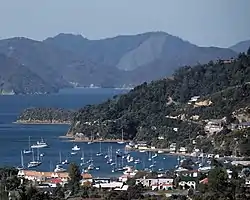Waikawa, Marlborough
Waikawa is a small settlement to the north east of Picton, Marlborough, New Zealand. Waikawa Bay opens onto Queen Charlotte Sound.[3][4]
Waikawa | |
|---|---|
 Waikawa Bay and marina | |
| Coordinates: 41°16′11″S 174°2′29″E | |
| Country | New Zealand |
| Region | Marlborough |
| Ward |
|
| Electorates | |
| Government | |
| • Territorial Authority | Marlborough District Council |
| • Marlborough District Mayor | Nadine Taylor |
| • Kaikōura MP | Stuart Smith |
| • Te Tai Tonga MP | Tākuta Ferris |
| Area | |
| • Total | 3.86 km2 (1.49 sq mi) |
| Population (June 2023)[2] | |
| • Total | 1,700 |
| • Density | 440/km2 (1,100/sq mi) |
The New Zealand Ministry for Culture and Heritage gives a translation of "bitter water" for Waikawa.[5]
Waikawa is an important New Zealand tourist destination because its large marina acts as gateway to the Marlborough Sounds and famous treks (hikes) such as the Queen Charlotte Track.
Waikawa is host to Waikawa Marina which is one of the largest marinas in New Zealand. Waikawa Marina hosts 600 yacht berths and 70 individual lock-up boatsheds. The marina offers a typical range of modern on-site marine services, supplies, and facilities. These facilities include a café/bar and accommodation.
Demographics
Waikawa covers 3.86 km2 (1.49 sq mi)[1] and had an estimated population of 1,700 as of June 2023,[2] with a population density of 440 people per km2.
| Year | Pop. | ±% p.a. |
|---|---|---|
| 2006 | 1,119 | — |
| 2013 | 1,272 | +1.85% |
| 2018 | 1,464 | +2.85% |
| Source: [6] | ||
Waikawa had a population of 1,464 at the 2018 New Zealand census, an increase of 192 people (15.1%) since the 2013 census, and an increase of 345 people (30.8%) since the 2006 census. There were 609 households, comprising 735 males and 729 females, giving a sex ratio of 1.01 males per female. The median age was 57.4 years (compared with 37.4 years nationally), with 183 people (12.5%) aged under 15 years, 129 (8.8%) aged 15 to 29, 654 (44.7%) aged 30 to 64, and 498 (34.0%) aged 65 or older.
Ethnicities were 88.1% European/Pākehā, 15.4% Māori, 1.6% Pasifika, 1.8% Asian, and 2.3% other ethnicities. People may identify with more than one ethnicity.
The percentage of people born overseas was 18.6, compared with 27.1% nationally.
Although some people chose not to answer the census's question about religious affiliation, 52.0% had no religion, 37.7% were Christian, 1.0% had Māori religious beliefs, 0.4% were Hindu, 0.2% were Muslim, 0.4% were Buddhist and 0.4% had other religions.
Of those at least 15 years old, 183 (14.3%) people had a bachelor's or higher degree, and 270 (21.1%) people had no formal qualifications. The median income was $30,200, compared with $31,800 nationally. 168 people (13.1%) earned over $70,000 compared to 17.2% nationally. The employment status of those at least 15 was that 537 (41.9%) people were employed full-time, 219 (17.1%) were part-time, and 36 (2.8%) were unemployed.[6]
Education
Waikawa Bay School is a coeducational contributing primary (years 1-6) school with a roll of 135 students as of April 2023.[7][8]
A native school existed at Waikawa Pa by 1877.[9]
References
- "ArcGIS Web Application". statsnz.maps.arcgis.com. Retrieved 21 July 2023.
- "Population estimate tables - NZ.Stat". Statistics New Zealand. Retrieved 25 October 2023.
- Peter Dowling, ed. (2004). Reed New Zealand Atlas. Reed Books. pp. map 61. ISBN 0-7900-0952-8.
- Roger Smith, GeographX (2005). The Geographic Atlas of New Zealand. Robbie Burton. pp. map 133, 139. ISBN 1-877333-20-4.
- "1000 Māori place names". New Zealand Ministry for Culture and Heritage. 6 August 2019.
- "Statistical area 1 dataset for 2018 Census". Statistics New Zealand. March 2020. Waikawa (Marlborough District) (306700). 2018 Census place summary: Waikawa (Marlborough District)
- "New Zealand Schools Directory". New Zealand Ministry of Education. Retrieved 12 December 2022.
- Education Counts: Waikawa Bay School
- McIntosh, Alister; Redman, William Edward; Allen, William Raymond, eds. (1940). Marlborough: A Provincial History. Blenheim: Marlborough Provincial Historical Committee. p. 345.
